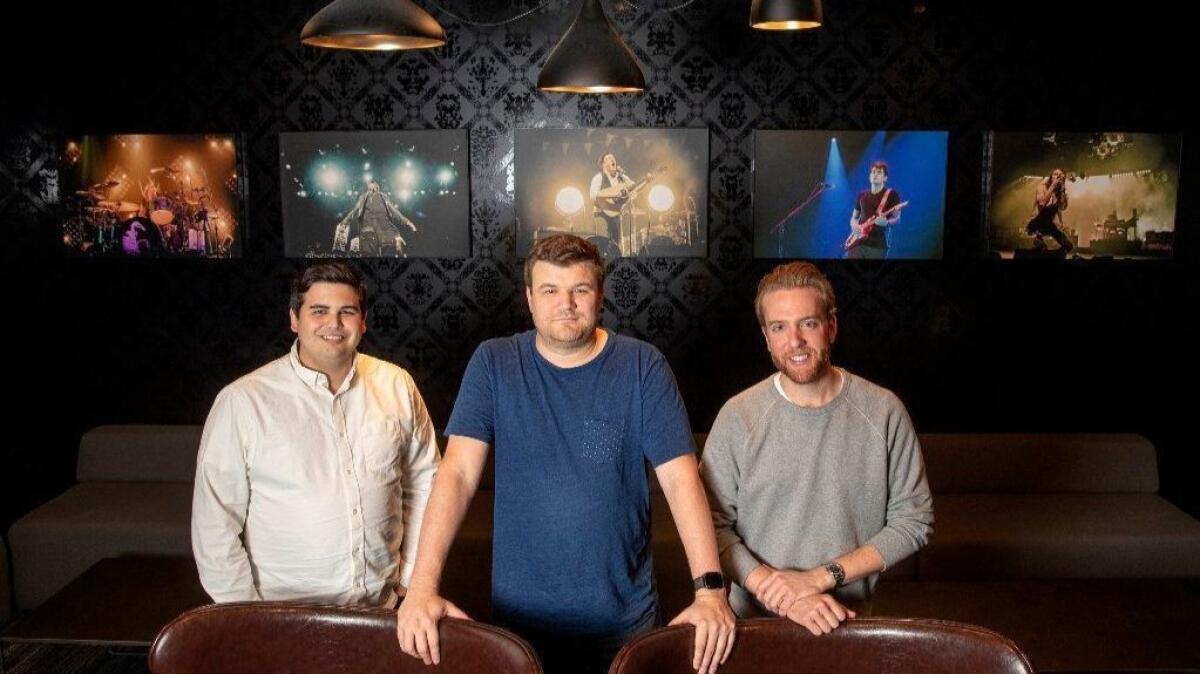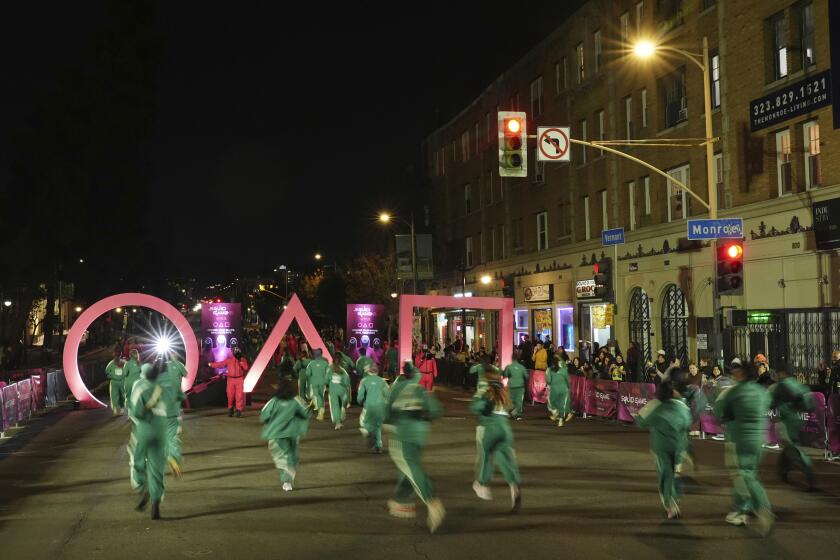How I Made It: How three middle school pals built the software that feeds the Super Bowl

Kevin Anderson, Jason Pratts and Max Roper are co-founders of Appetize. The trio started the company out of their Santa Monica apartment in 2011 as a simple app for ordering food to be delivered to your seat at sports games.
Today, it’s a full-service point-of-sale software company in Playa Vista that handles orders for edibles in hospitals, colleges and music venues such as the Wiltern and Hollywood Palladium, and a majority of the sports stadiums in the country. Appetize, which has almost 300 employees, has raised $50 million from investors including the Dodgers, the NFL and Shamrock Capital Advisors, a successor to the investment fund founded by Roy E. Disney.
Schoolmates in the 818
The trio met in middle school at Los Angeles Baptist High in North Hills. Roper, the company’s chief executive, and Pratts, chief operating officer, were both from the Valley, but Anderson, who now serves as chief strategy officer, made the daily trek from Santa Monica.
The friends took different paths after graduating from L.A. Baptist. Anderson gave professional golf a shot. Pratts went to Cal State Northridge for a business degree, starting up small businesses as he went. Roper, the technology guy on the team, took one class at UCLA, dropped out and then started working for Apple Inc., before joining the Red Bull Stratos team in Roswell, N.M., where he built equipment that would let a skydiver jump from space.
The Lakers break
A 2011 game at Staples Center brought the trio back together and sparked the idea that would turn into Appetize.
“We saw this awful ordering experience, where the waiter jots down your order on a piece of paper, grabs your credit card and disappears for 30 minutes to do God knows what, and then charges you a $15 delivery or convenience fee,” Anderson said. “We had paid 100 bucks to go see Kobe, and we’re sitting there saying, ‘There’s gotta be a better way.’ ”
The friends had been bouncing around ideas for how to make an app for food delivery, but the stadium experience opened their eyes to a different business model.
“At the game we thought: ‘Why don’t we put a seating chart in here instead of delivering to a house?’ ” Roper said. “It was one of those very logical ideas where you say it in one sentence and it makes complete sense — an app for ordering food to your seat at the stadium and have it delivered — and everyone’s like, that’s awesome.”
I just wanted to get a beer delivered to my seat...
— Max Roper, CEO, Appetize
Three’s a company
Once the idea was set, the pals decided to move together into a two-bedroom apartment in Santa Monica. Pratts got stuck with the living room.
“We were literally living off of the Red Bulls that Max would bring home and the classic kind of pizza-and-ramen diet,” Anderson said. “We’d all wake up to each other typing on our computers and making sales calls to the East Coast.”
Roper taught himself how to code for Apple’s iOS, and Pratts took care of operations. Anderson, whose family ran a beverage distribution business in the area, took point on finding some clients.
San Diego to Madison Square
Anderson got through to the general manager at the San Diego Sports Arena — former home of the Clippers — and landed their first contract.
“I said, ‘Hey, if you commit to a three-month trial, we’ll give you this new technology where your fans can order on their phones and have it delivered to them,’ ” Anderson recalled. “He said, ‘That’s a no brainer.’ ”
With a proof of concept in hand from that trial run, the team was able to pitch their way up to the big leagues — a contract at Madison Square Garden. But even then, the company was barely making any money.

Step, pivot, step
Once the three started working with more venues, they realized there was room to grow beyond a consumer-facing app — they could run the whole system.
“The more that we saw the technology that’s in sports venues, it was just awful,” Roper said. “People were printing out a sheet of paper with the pricing info, and if you want to change the price you have to reprint 700 pieces of paper for the terminals and slide it under the keypad — that’s when we were like, ‘We can definitely do something here because it’s almost easy to disrupt it.’ ”
Clients started coming to them, asking for something better. Live Nation, the Beverly Hills events company, asked Appetize to run the massive Bonnaroo music festival in Tennessee.
“We transacted a million dollars in a big open field across a thousand iPads, and thankfully it went off without a hitch,” Anderson said. “Those early guys were so interested in having a solution that was more modern that they were willing to try things and willing to give us a little grace when we needed to learn and build and maybe didn’t have it yet.”
Moving up (and out)
In 2015, the trio raised $450,000 in their first round of investment through the Dodgers accelerator — and finally paid themselves enough to move into their own apartments.
“It was never like, ‘We’re starting a business. Let’s start making money. Let’s get like a revenue model. Let’s start figuring it out,’ ” Roper said. “I just wanted to get a beer delivered to my seat, and I think I can build this in my free time, and then let’s see if this works.”
Focus and grow
Clients from different industries — hotels, hospitals, casinos — started knocking on Appetize’s door.
“It’s pretty funny when you go look at some of our first investment pitches,” Pratts said. “It’s a big web of all these different industries and all this craziness, but every management business book you read is like, focus focus focus.”
Sticking initially with big sports and entertainment venues paid off.
“Sports is arguably the hardest industry to start in,” Roper said. “If your servers go down for five minutes during the Super Bowl that’s a very, very big problem — for us there’s no MVP [minimum viable product] in sports, it has to be perfect.”
That’s made the company’s current expansion into healthcare, restaurants and retail seem relatively easy — although having $50 million in capital and almost 300 employees, up from 30 at the beginning of 2015, also helps.
Open for business
Now only 5% of Appetize’s business flows through the original app, with most transactions happening at the company’s touchpad registers and self-service kiosks. The trio says listening to clients — and anyone else who has an opinion — has led them in the right direction.
“One of the big things that we did was just solicit feedback without worrying about nondisclosure agreements,” Roper said. “We built this drink-mixing feature that was super awesome based off of another buddy from high school saying he wished he could mix his own drink on there. I was like, ‘Hell yeah. Let’s build that!’ ”
Always on call
Being open to clients also means returning their calls.
“One of our big mantras is get back to the client within 20 minutes even if you don’t have the answer. People just love a quick response,” Anderson said.
“We’re building software. It’s not always going to be perfect,” Pratts said. “Sometimes something happens and you want to go hide in a corner, but you really can’t — it’s about how you respond.”
They love L.A.
“When we were first starting to raise money, everyone said you have to go to San Francisco, that’s the only way that you can do it,” Roper said. “We went up there a bunch and tried to raise money, but then it always came back to moving up there. We were like, ‘We’ve got a cool apartment by the beach, we love L.A., our families are here and our early customers were here.’ ”
“You’ve gotta follow your gut sometimes,” Roper added. “If you have drive, you can do it. You don’t have to sit in a Starbucks on Market Street to actually do it. You can do it right here too.”
More to Read
Inside the business of entertainment
The Wide Shot brings you news, analysis and insights on everything from streaming wars to production — and what it all means for the future.
You may occasionally receive promotional content from the Los Angeles Times.











